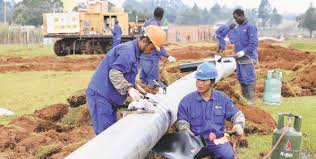Govt signs Shs12 trillion contract for oil pipeline feasibility study
Posted on : Monday , 17th November 2014

The government has signed a contract with Toyota Tsusho, a Japanese company to carry out a feasibility study that will see the crude oil pipeline construction start
The government has signed a contract with Toyota Tsusho, a Japanese company to carry out a feasibility study that will see the crude oil pipeline construction start.
Energy minister Irene Muloni signed the $4.5b (Shs12.3 trillion) contract at the Ministry of Energy Sector Review held last week in Kampala.
Ms Muloni said the feasibility study is one of the regional projects that the governments of Uganda, Rwanda and Kenya agreed to develop together in order to share resources.
The countries would also be able to come up with the least cost tariffs for the export of crude oil to access the international markets
“The feasibility study will be able to look at the best route to use, it is going to look at the options of the various points of the east coast of Kenya to enable us give a pipe line which is sustainable and that will give the least prices of transporting a barrel of crude to access the international market,” said the minister
She added: “They will also be able to come up with options of how best we can structure projects in terms of ownership and management because this is a long-term project of 25 years and above to avoid crude oil price changes by any partner government”
The feasibility study that will last 20 weeks (five months), will prompt government to make a decision on how to construct the pipeline next year.
The pipe is expected to attract more additional costs because of its longevity and nature of crude oil expected to transport.
“It is going to be one of the longest heated crude pipe line because our crude is waxy so for us to transport it to the international market, it must be heated meaning more additional costs, not less than $4.5 billion (about Shs12.3 trillion),” the minister said.
Local demand
According to Energy minister Irene Muloni Uganda as a country consumes petroleum products such as petrol, diesel and kerosene, estimated at 20,000 barrels per day. The oil refinery once in operation, is expected to start by producing 20,000 to 30,000 barrels per day which will meet the local demand.
The minister said the 60,000 barrels per day refinery once in in placewill supply local demand and the excess will be exported to international markets


